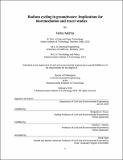| dc.contributor.advisor | Benjamin D. Kocar and Charles F. Harvey. | en_US |
| dc.contributor.author | Mehta, Neha,Ph. D.Massachusetts Institute of Technology. | en_US |
| dc.contributor.other | Massachusetts Institute of Technology. Department of Civil and Environmental Engineering. | en_US |
| dc.date.accessioned | 2019-07-15T20:36:08Z | |
| dc.date.available | 2019-07-15T20:36:08Z | |
| dc.date.copyright | 2019 | en_US |
| dc.date.issued | 2019 | en_US |
| dc.identifier.uri | https://hdl.handle.net/1721.1/121704 | |
| dc.description | This electronic version was submitted by the student author. The certified thesis is available in the Institute Archives and Special Collections. | en_US |
| dc.description | Thesis: Ph. D. in Environmental Engineering, Massachusetts Institute of Technology, Department of Civil and Environmental Engineering, 2019 | en_US |
| dc.description | Cataloged from student-submitted PDF version of thesis. Page 133 blank. | en_US |
| dc.description | Includes bibliographical references. | en_US |
| dc.description.abstract | Radium (Ra) is a radioactive alkaline earth element and forms naturally from the decay of uranium (U) and thorium (Th), elements that are ubiquitous within most rocks, soils and sediments. Radium contamination associated with anthropogenic activities such as hydraulic fracturing, uranium mining, and nuclear waste disposal poses significant public and ecological health risks. While occurrence of Ra in groundwater is concerning for public health and safety reasons, Ra is also a powerful tracer for calculating groundwater discharge and pollutant loading to coastal water. In this thesis, I investigate processes controlling Ra mobility in groundwater that are important for developing remediation strategies and improving our understanding of Ra tracer applications. | en_US |
| dc.description.abstract | In first section of this thesis, I use a novel closed loop flow-through system to measure recoil-derived fluxes of Ra and other daughter nuclides from two crushed rock types with disparate physical and geochemical characteristics. Next, I model the effect of alpha recoil on fractionation of Ra isotopes in groundwater. Our findings showed that alpha-recoil process drives the widespread variability in Ra isotopes observed numerous field measurements and highlight the importance of understanding the hydrology of a groundwater flow system prior to interpreting Ra activities. In the second section of this thesis, I experimentally studied geochemical controls on processes affecting Ra and metal mobility in shale-water system. The results elucidate role of pH, ionic strength and additive in fracture fluid on Ra mobility in produced water. The findings from this work illuminated processes responsible for retention and mobilization of Ra and potentially problematic solutes in the subsurface. | en_US |
| dc.description.abstract | In the last section of this thesis, the role of biomineralization on Ra uptake from solution by the cyanobacteria species Candidatus gleomargarita lithophora was investigated. Our results showed that G. lithophora grew normally in presence of Ra and sequestered 99% of the total aqueous Ra over this time period within biomass and biominerals. The findings suggest that under certain conditions, biomineralization of Ra could be used to develop in-situ bioremediation schemes for removal of Ra in groundwater and contaminated effluent streams. | en_US |
| dc.description.statementofresponsibility | by Neha Mehta. | en_US |
| dc.format.extent | 133 pages | en_US |
| dc.language.iso | eng | en_US |
| dc.publisher | Massachusetts Institute of Technology | en_US |
| dc.rights | MIT theses are protected by copyright. They may be viewed, downloaded, or printed from this source but further reproduction or distribution in any format is prohibited without written permission. | en_US |
| dc.rights.uri | http://dspace.mit.edu/handle/1721.1/7582 | en_US |
| dc.subject | Civil and Environmental Engineering. | en_US |
| dc.title | Radium cycling in groundwater : implications for bioremediation and tracer studies | en_US |
| dc.type | Thesis | en_US |
| dc.description.degree | Ph. D. in Environmental Engineering | en_US |
| dc.contributor.department | Massachusetts Institute of Technology. Department of Civil and Environmental Engineering | en_US |
| dc.identifier.oclc | 1102675277 | en_US |
| dc.description.collection | Ph.D.inEnvironmentalEngineering Massachusetts Institute of Technology, Department of Civil and Environmental Engineering | en_US |
| dspace.imported | 2019-07-15T20:36:05Z | en_US |
| mit.thesis.degree | Doctoral | en_US |
| mit.thesis.department | CivEng | en_US |
